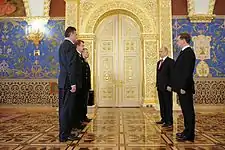Cheget
Cheget (Russian: Чегет) is a "nuclear briefcase" (named after Mount Cheget in Kabardino-Balkaria, Russia) and a part of the automatic system for the command and control of Russia's Strategic Nuclear Forces (SNF) named Kazbek (Казбек, after Mount Kazbek).[1]


History
The cheget was developed during Yuri Andropov's administration in the early 1980s. The suitcase was put into service just as Mikhail Gorbachev took office as General Secretary of the Central Committee of the Communist Party of the Soviet Union in March 1985.[2] It is connected to the special communications system code-named Kavkaz (Кавказ, named after the local name for the Caucasus region), which "supports communication between senior government officials while they are making the decision whether to use nuclear weapons, and in its own turn is plugged into Kazbek, which embraces all the individuals and agencies involved in command and control of the Strategic Nuclear Forces."
The Russian president has a cheget on hand at all times. It is usually assumed although not known with certainty that nuclear briefcases are also issued to the Minister of Defense and the Chief of the General Staff.[3][4] The General Staff receives the signal and initiates the nuclear strike through the passing of authorization codes to missile silo launch complexes/ballistic missile submarines or by remotely launching individual land-based intercontinental ballistic missiles/submarine-launched ballistic missiles.[5]
On January 25, 1995, in the Norwegian rocket incident, the cheget was activated in response to a misidentified Brant XII four-stage sounding rocket, launched by Norwegian and U.S. scientists; it was the only time a nuclear briefcase has been activated in preparation for an attack.[2]
See also
- Designated survivor
- Nuclear football – the American counterpart
- Two-man rule
- Cold war
- Nuclear warfare
- Dead Hand (nuclear war) – Soviet nuclear-control system
References
- "Archived copy". Archived from the original on 2007-12-25. Retrieved 2008-01-14.CS1 maint: archived copy as title (link)
- David Hoffman (15 March 1998). "Cold-War Doctrines Refuse to Die". Washington Post. Retrieved 7 August 2014.
- Mikhail Tsypkin (September 2004). "Adventures of the "Nuclear Briefcase"". Strategic Insights. 3 (9). Archived from the original on 2004-09-23.
- Alexander Golts (20 May 2008). "A 2nd Briefcase for Putin". Moscow Times. Archived from the original on 2011-06-04.
- Alexander A. Pikayev (Spring–Summer 1994). "Post-Soviet Russia and Ukraine: Who can push the Button?" (PDF). The Nonproliferation Review. 1 (3). doi:10.1080/10736709408436550. Retrieved 6 August 2014.
